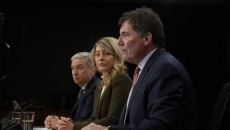British Columbia's government is proposing giving cabinet broad-reaching emergency powers to respond to what Premier David Eby calls the "human-caused disaster" coming in like a freight train from the United States.
In the face of President Trump’s threats, British Columbians are more united than ever.
— David Eby (@Dave_Eby) March 13, 2025
I sat down with Sky News in my office earlier this week. pic.twitter.com/COgP5ivzCm
A bill, tabled in the legislature Thursday, gives cabinet the power to implement charges on vehicles using B.C. infrastructure, such as highways and ferries, while allowing the politicians to make directives about public-sector procurement.
It would eliminate provincial trade barriers in the province, allowing goods produced, manufactured or grown elsewhere in Canada to be sold or used in B.C.
Along with the specific changes, it would also give cabinet the power to make regulations "addressing challenges, or anticipated challenges" from the actions of a foreign jurisdiction or for a purpose "supporting the economy of British Columbia and Canada."
Regulations do not require debate in the legislature.
Eby said the new law would allow the government to be "nimble" in its response to the escalating trade war with the United States that is constantly changing.
"When there's an emergency, like a natural disaster, we have these authorities. This is a human-caused disaster. We can see it coming. We don't know what it is, and we need to be able to respond quickly," he said.
Attorney General Niki Sharma said there are "guardrails" in place including a sunset clause that would repeal every action by May 2027, and that details on government actions would come to the legislature through reports.
"Government cannot use the authorities given by this bill to allow natural resource projects without permits or environmental assessments, and it cannot use the authorities to sidestep Indigenous consultation requirements," she said.
Sharma said the tools would not be used "unless the U.S. forces our hand."
Eby said U.S. President Donald Trump is "unpredictable" and "erratic" and the province needs to be able to move quickly to minimize damage from his actions.
He said his government doesn't want to use the measures in the bill, but they need to make sure they can respond quickly.
"And frankly, I can see it coming like a freight train."
Opposition B.C. Conservative Leader John Rustad said in a post on social media that if residents thought government overreach during the pandemic was bad, wait until they hear about what the NDP is trying with the latest bill.
"Bill 7 gives B.C.'s already authoritarian, top-down NDP government sweeping, almost unlimited powers with zero oversight," his post on X said.
The bill includes provisions that allow the government to introduce road pricing and collect their personal information, Rustad said.
On Wednesday, Trump placed 25 per cent tariffs on all steel and aluminum imports to the United States, including those from Canada.
The week before, the president started — then partially paused — 25 per cent tariffs on all Canadian and Mexican goods.
On Thursday, Trump posted on social media that he would place a 200 per cent tariff on all wines and other alcohol products coming out of Europe, if the European Union doesn't scrap its planned tax on American whiskey.
Eby said he was prepared to defend the bill to British Columbians.
"The government is governing with a very slim majority. At any time members of the legislative assembly could decide that this was overreach, collapse the government, we'd be into an election," he said.
"I would stand and tell British Columbians that these authorities, this bill, is to respond to nightmare scenarios that are imminently in the realm of the possible with this president."
Eby mentioned a possible scenario where the United States "rips up the Columbia River treaty," which manages the shared stewardship of waterways between the two countries.
Earlier this month, Eby said the new law would provide the ability to levy fees on U.S. trucks travelling through the province to Alaska.
The legislation was tabled and passed first reading as BC Hydro said it was banning Tesla products from its electric vehicle rebate program.
Its website says the change would cover Tesla chargers, batteries and inverters and is part of the government's move to give preference to Canadian goods and exclude U.S. ones from rebates if practical.
The Crown corporation says the exclusion became effective on Wednesday, but Tesla products that were purchased or received pre-approval for rebates before then are still qualified.
BC Hydro's rebate program covers up to 50 per cent of the purchase cost and installation of a home charger, up to a maximum of $350.
Tesla CEO Elon Musk has been closely associated with the Trump administration.






